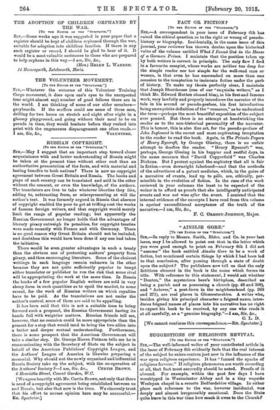FACT OR FICTION?
[To Tax Ennas se TIM "SFXOSAT08:1 See,—A correspondent in your issue of February Gth has raised the ethical question as to the right or wrong of pseudo- history or biography_ Incidentally, in the same issue of this journal, your reviewer has thrown doubts upon the hietorical value of the volume entitled What I Found Out in the Hoses of a German Prince. I maintain that the position taken up, by both writers is correct in principle. The only flaw I find in a favourite essayist,. whose works are neither too deep for the simple reader nor too simple for the welkread man or woman, is that even he has succumbed on more than one occasion to the temptation to insinuate fiction under the garb of history. To make my thesis perfectly clear,. I maintain that Joseph Shorthouse (one of our "exquisite writers," as I think Mr. Edward Hutton classed Lime in his first aud famous work, very lawfully and properly introduces the narrator of the tale in his second or pseudo-preface, his first introduction being an exquisite definition of the " romance." as be understood the term—perhaps the most beautiful exposition of the subject ever penned. But there is no attempt at hoodwinking the reader as to the non-historical personality of the narrator. This is honest, this is also fine ark for the pew/a-preface of John Inglesant is the serest and most captivating temptation to the reader to read the book. Again, in The Private Papers of Henry Ryecroft, by George Gissing, there is no unfair attempt to deceive the reader. "Henry Ryeereft was, perhaps, George (Dosing in his happier and restful days, in the same measure that "David Copperfield" was Charles Dickens. But I protest against the sophistry that all is fair in fiction—even downright falsehood—and that the methods of the advertisers of a patent medicine, which, in the guise of a narrative of events, lead op to pills, are, ethically, per- missible in the evolution of fiction. In the ease of the work reviewed in your columns the least to be expected of the writer is to afford us proofs that she intelligently anticipated events and was not wise after the event. I contend that the internal evidence of the excerpts I have read from this volume is against unconditional acceptance of the truth of the narrative.—I am, Sir, &c.,
F. a ORNERT-JOHNSON, Major.






































 Previous page
Previous page